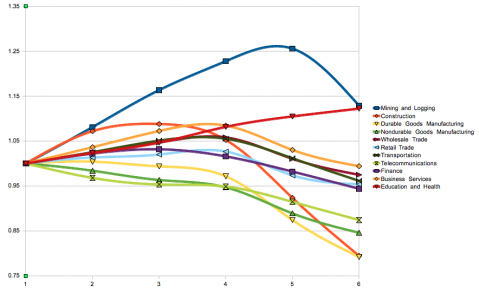Structural v. Cyclical, Again
The question of whether the United States’ unemployment is structural (due to some industries getting bigger and others shrinking, not ameliorated much by
Jul 31, 2020748.7K Shares10.2M Views
The question of whether the United States’ unemployment is structural (due to some industries getting bigger and others shrinking, not ameliorated much by stimulus spending or looser monetary policy) or cyclical (due to an economy-wide lack of demand, ameliorated by stimulus spending and looser monetary policy) continues to rage — with a spate of recent Paul Krugmanand Ryan Aventposts.
I continue to thinkthe United States clearly has both problems. The entire economy — basically, every state, every city, every business, everywhere — is suffering because sales are down. That problem is primary. On top of that, workers in certain shrinking sectors — most notably construction — need to find new trades.
Here’s a chartshowing employment in various major economic sectors. (The x-axis is years, starting in 2005, and the y-axis shows the number of jobs relative to 2005.) Most sectors have declined, but some are much worse off than others — demonstrating the unemployment as cyclical and structural.
In an interesting related post, Mike Konczal showsthat a lot of the United States’ structural unemployment is due to the housing crisis — more than due to skills mismatch. Workers that cannot sell their houses cannot move to new, better jobs. That means that those workers tend to stay unemployed for longer. Indeed, Konczal cites an IMF study showing that the country’s housing woes cause two or 2.5 times more unemployment than the skills-mismatch problem does.

Paolo Reyna
Reviewer
Paolo Reyna is a writer and storyteller with a wide range of interests. He graduated from New York University with a Bachelor of Arts in Journalism and Media Studies.
Paolo enjoys writing about celebrity culture, gaming, visual arts, and events. He has a keen eye for trends in popular culture and an enthusiasm for exploring new ideas. Paolo's writing aims to inform and entertain while providing fresh perspectives on the topics that interest him most.
In his free time, he loves to travel, watch films, read books, and socialize with friends.
Latest Articles
Popular Articles
